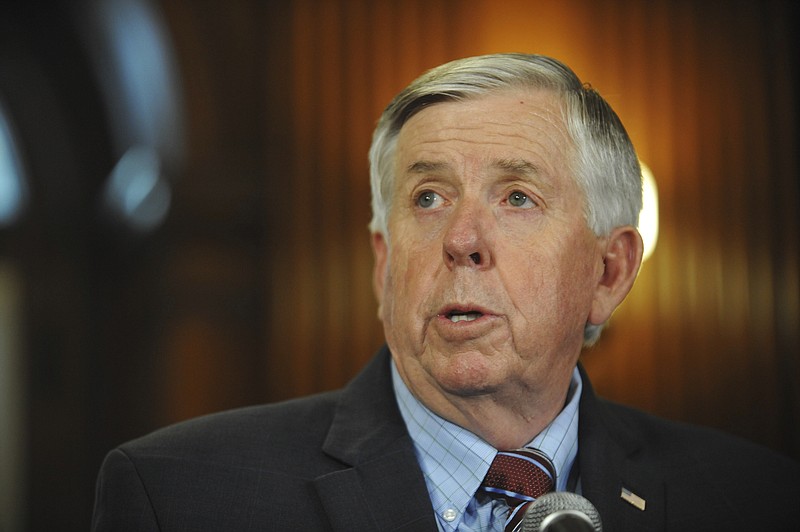Gov. Mike Parson informed the federal government Monday that the state will accept resettlement of lawfully-admitted refugees - a choice given to state and local leaders in September by President Donald Trump.
Trump signed an executive order Sept. 26 that required consultation with and the consent of state and local authorities for resettlement of refugees to occur within those jurisdictions.
On the same day, Trump submitted to Congress through the departments of State, Homeland Security, and Health and Human Services that the United States would resettle no more than 18,000 refugees in the 2020 fiscal year - a historic low and significantly less than the limit of 30,000 refugees the year before.
The policies are part of the Trump administration's efforts to reduce legal and illegal immigration, and the pair of the administration's actions in September were swiftly criticized by humanitarian authorities.
In addition to finding the decreased resettlement cap "unacceptable" amid "the world's greatest forced displacement crisis on record," Bishop Joe S. Vsquez, who is Chairman of the Committee on Migration of the United States Conference of Catholic Bishops, said in a statement that there were also "deep concerns" about the executive order permitting state and local authorities to turn away refugees.
"We fear the collateral negative consequences, especially for refugees and their families, of creating a confusing patchwork across America of some jurisdictions where refugees are welcomed and others where they are not," Vsquez said.
The executive order "could leave thousands of refugees, former refugees, and U.S. citizens without access to the services they need. It also subjects the safety and security of families and community members to the whims of politics," according to Amnesty International.
Three refugee resettlement agencies - Church World Service, HIAS and Lutheran Immigration, and Refugee Service - also sued the Trump administration in November in federal court in Maryland to challenge the executive order.
So far, it does not seem any governors have decided to keep out refugees, though some had yet to make a decision, including Texas' governor. Texas took in the largest number of refugees in 2019.
As of Dec. 22, more than 30 governors had agreed to accept refugees, as well as more than 80 local governments, including rural towns.
Parson, in a letter Monday that gave Missouri's consent to U.S. Secretary of State Mike Pompeo, opened by saying "Thank you and President Trump for your leadership on immigration issues and your willingness to cooperate and consult with state governments regarding the resettlement of lawfully admitted refugees."
Parson added the executive order "allowing states to have greater involvement in the process of determining the placement of properly vetted refugees within their borders is to be applauded."
He said consent to refugee resettlement in Missouri "shall be valid unless or until it is withdrawn."
Parson said Tuesday in a news release from his office that refugees "enhance this state's workforce and add value and diversity to their communities with assistance from those agencies authorized by the federal government to resettle refugees," especially in St. Louis, Kansas City, Springfield and Columbia.
"Since 2002, nearly 18,000 refugees from 45 countries have resettled in Missouri," according to Parson in his letter to Pompeo.
"We will continue to work hard to ensure refugees become a thriving part of our communities, and I am confident this demonstration of compassion will mark the first step in these immigrants becoming patriotic and productive fellow Americans," Parson added.
As for the Trump administration's view of its decision to reduce refugee resettlement: "Attacking problems at the source makes it possible to help many more vulnerable people, and to do so much more rapidly, than could be done through resettlement or asylum in the United States," according to a statement from the U.S. Department of State.
"It is misguided to see our refugee admissions program as the singular measure of America's humanitarian-based immigration efforts," the State department added. "Our refugee ceiling must also take into account our national security and foreign policy interests."
Of the 18,000 refugee resettlement cap, 4,000 spots would be for Iraqis whose work for the U.S. put them in danger, 5,000 for people persecuted for their religious beliefs, and 1,500 for people from Honduras, Guatemala and El Salvador, according to Reuters.
There are 71 million people displaced around the world, according to the State department. Under a separate system than refugee resettlement, the U.S. expects to process more than 350,000 individuals in new asylum cases in fiscal year 2020.
On the executive order requiring state and local consent for resettlement, "The federal government's close cooperation with state and local governments is necessary to support refugees' successful integration into American society and our labor force," according to the State department.
The Associated Press contributed to this report.

